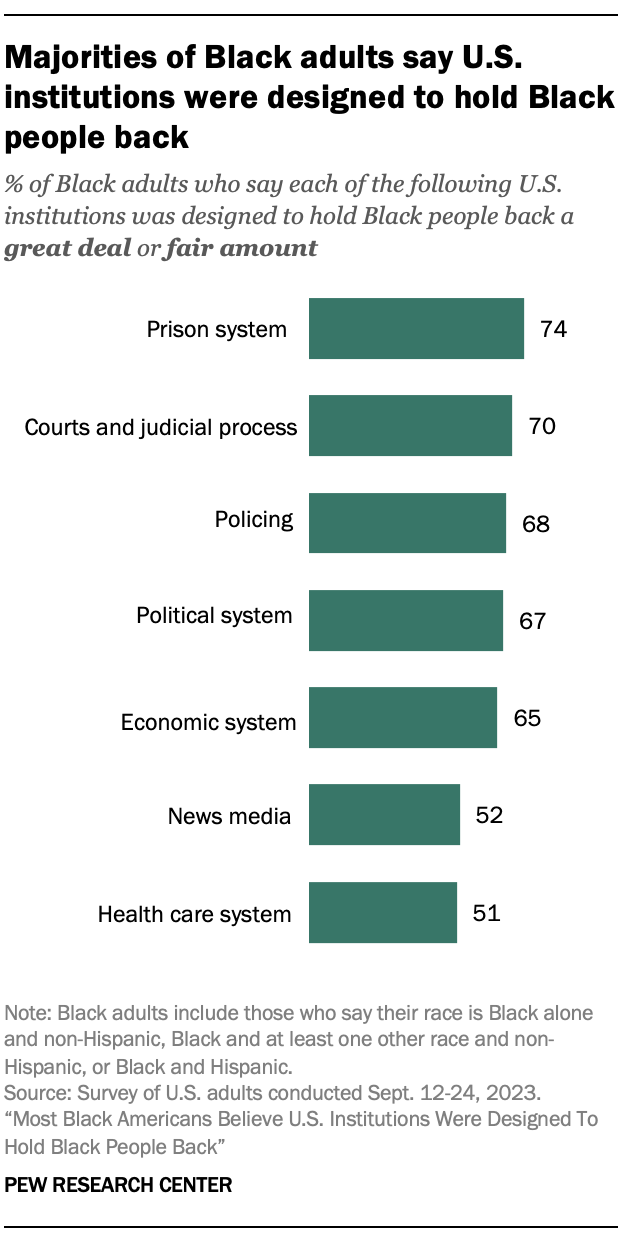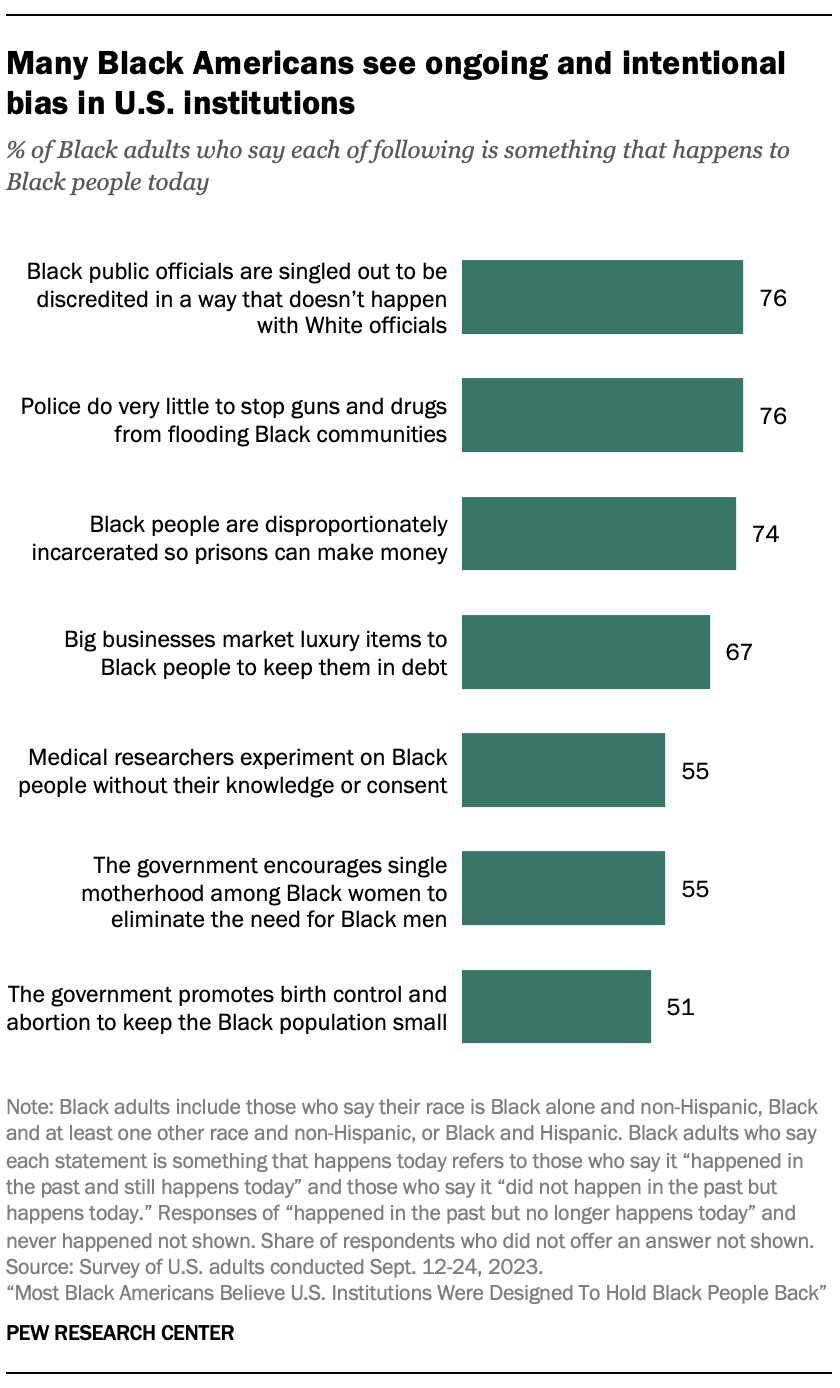
By Kiana Cox
Claudia Deane, Mark Hugo Lopez and Neha Sahgal contributed to this report.
While many Black Americans view themselves as at least somewhat successful and are optimistic about their financial future, previous work by Pew Research Center also finds most believe U.S. institutions fall short when it comes to treating Black people fairly.
A new analysis suggests that many Black Americans believe the racial bias in U.S. institutions is not merely a matter of passive negligence; it is the result of intentional design. Specifically, large majorities describe the prison (74%), political (67%) and economic (65%) systems in the U.S., among others, as having been designed to hold Black people back, either a great deal or a fair amount.
Black Americans’ mistrust of U.S. institutions is informed by history, from slavery to the implementation of Jim Crow laws in the South, to the rise of mass incarceration and more.
Several studies show that racial disparities in income, wealth, education, imprisonment and health outcomes persist to this day.

The goal of the current study is to explore how Black Americans think about U.S. institutions and the impact they have on their success.
Specifically, we examine the extent to which Black Americans believe U.S. institutions intentionally or negligently harm Black people and how personal experiences of racial discrimination factor into these beliefs.
The beliefs and narratives that Black Americans have about institutional harm have long been studied by scholars in the health and social sciences and the humanities. Narratives about how institutions were designed to hold Black people back also surfaced in several of the online focus groups Pew Research Center conducted with this study last year. (Selected quotes from our focus group discussions can be found in an accompanying text box.)
To measure the prevalence of these narratives of mistrust, we conducted a survey of 4,736 Black adults in the U.S. from Sept. 12 to 24, 2023.
First, respondents were asked if they had ever heard a series of statements about how U.S. institutions might intentionally or negligently harm Black people. Respondents were then asked if they thought these harms were also happening to Black people today. Here are some key findings about Black Americans’ beliefs in institutional mistrust.
- 76% of Black adults say Black public officials today are singled out to be discredited in a way that doesn’t happen to White public officials.
- 76% say police today do very little to stop guns and drugs from flooding Black communities.
- 74% say Black people are more likely than White people to be incarcerated because prisons want to make money on the backs of Black people today.
- 67% of Black Americans say businesses today target marketing of luxury products to Black people in order to put them into debt.
- 55% of Black adults say secret and nonconsensual medical experiments (like the Tuskegee study) are happening to Black people today.
- 55% of Black adults say the government today encourages single motherhood and the elimination of Black men from Black families.
- 51% of Black adults say the government promotes birth control and abortion to reduce the size of the Black population, and this is happening today.
The report also finds that Black Americans who have experienced racial discrimination are more likely to believe U.S. institutions intentionally or negligently harm Black people.
There are also modest differences among Black Americans by gender, education, family income and political affiliation. Still, majorities across many Black demographic subgroups are familiar with these statements about the intentions of many U.S. institutions and say these things are happening to Black people today.
In their own words: Quotes from our 2023 focus groups of Black Americans
To understand how Black Americans view success and setbacks in the U.S., in May and June 2023, we conducted seven online focus groups nationally among Black people of varying income, age and ideological backgrounds. For details on how groups were defined and recruited, refer to the focus group methodology.
One theme that emerged: Some participants felt they are up against a system deliberately designed to hold them back. The following are some illustrative quotes:
“I believe there are … strategic works, behind the scenes, that are being done to sabotage a Black person’s effort. … You could be on the road to success with nothing stopping you. But then, all it takes is one incident that was planned and plotted against you to destroy your life.”
– Woman, low-income group, early 50s
“As Black people we are always fighting some type of fight. … We always get to some type of height of success. And then there’s always something that takes us down. …There is always something in the way.”
– Woman, young adult group, late 20s
“Well, there’s institutionalized stuff that is invisible. …There are institutionalized things that are in place that one has always suspected, but because they are seemingly benign, you can’t really call them out on it. …There are things like that which I think are purposely built into society or industries or whatever to keep certain numbers down because of access to financial gain.”
– Man, high-income group, late 30s
“I trust the government to an extent, but when it comes to certain things, I don’t. For example, take the pandemic. They had all this help out there for people, but there were certain people that applied for help that just couldn’t get it and they were literally just struggling to just get by. … I feel like us Black people are helped the least because we’ve always had the short end of the stick.”
– Woman, Republican group, late 20s
“This is a capitalistic society. And I feel as though Black men just have to be the ones at the bottom in order for this system to succeed. … I think that a few hands may be part of this. I don’t want to speculate, but it just still seems to be a system set in place where Black people, especially Black men, have not been successful for a while. We can even go back to Black Wall Street where we were starting to have a little bit of success, and then that was taken down by the powers to be. So whatever system it is, it’s a pretty good system that doesn’t reveal itself so easily.”
– Man, Republican group, late 30s
*Editor’s Note:
The Pew Research Center revised its report originally released June 10, titled ““Most Black Americans Believe Racial Conspiracy Theories About U.S. Institutions,” after receiving criticism for saying a majority of Black Americans believe “racial conspiracy theories” about U.S. institutions.
The Pew Research Center issued its revised report on June 15, with a new title: “Most Black Americans Believe U.S. Institutions Were Designed to Hold Black People Back,” which now includes additional context and quotes from some of the respondents.
The study’s goal is to explore how Black Americans think about U.S. institutions and the impact they have on their success, and highlights issues such as discrimination in the medical field, incarceration, and crime impacting Black communities.



